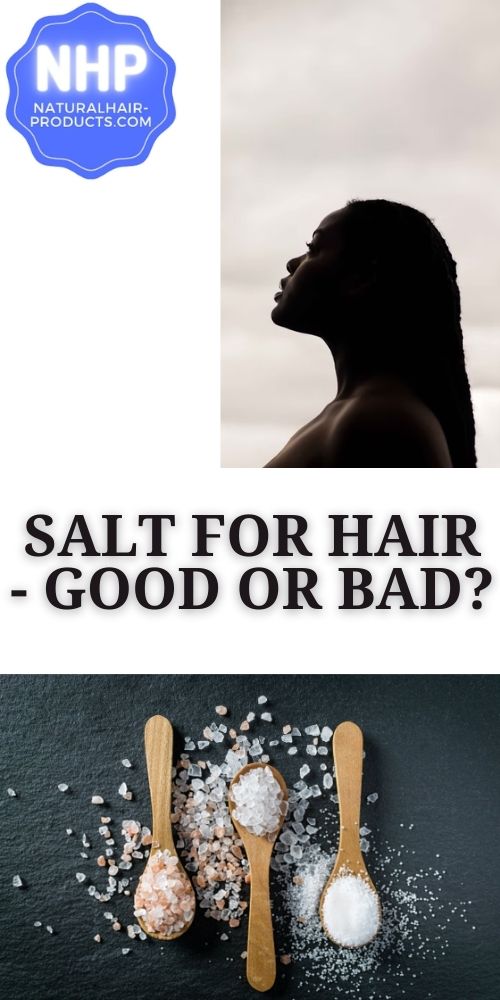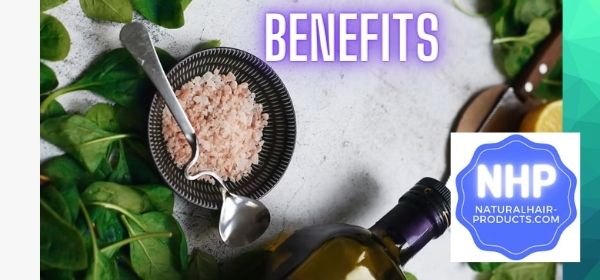Salt For Hair Growth & Health Benefits
- NHP
- Hair Growth 101
- Food for Hair Growth
- Salt For Hair Growth
Salt for hair growth and health? Hmmm…
Would you believe if we say that salt, which you use to enhance the taste of your everyday meals, can also be a part of your hair care regimen? Yes, you read that right!
Salt, an essential kitchen staple can be your secret ingredient too to help achieve rich volume and textured hair.
In this article, let’s understand more about the different types of salts that can be used for hair, how your scalp and hair benefits from them and what are the right ways to use them. Read on.
[RELATED ARTICLE: See great foods for hair growth...]
Types Of Salt Used For Hair & Scalp Treatments
- Table Salt - It is the most easily available and inexpensive salt. Table salt is highly refined and contains iodine which benefits your scalp health. It has natural anti-inflammatory and anti-microbial properties too that help to maintain a healthy dermis layer on your scalp.
- Sea Salt - Sea salt is generally coarser than table salt. It is naturally produced through the distillation process which leaves the salt retaining higher amounts of minerals than the table salt. However, sea salt also comes with the risk of having heavy metals such as lead which can cause adverse reactions on your scalp. Hence, it is recommended to use sea salt in minimum amounts with caution.
- Himalayan Pink Salt - Himalayan pink salt is often mixed in bath salts and has a soothing effect on your scalp. Along with other minerals that we generally find in other salts, Himalayan pink salt contains traces of iron oxide which gives it a light pink shade. Unlike table salt, Himalayan pink salt undergoes lesser processing stages and contains no additives. This makes it a natural alternative for sea salt in treating hair loss and boosting hair growth.
- Kosher Salt - Kosher salt is traditionally used in Jewish foods. It is distinctive with a rounder and coarser texture while it retains a high amount of natural minerals like sea salt. However, it is not recommended to use kosher salt for hair or on the scalp due to its coarser structure. Instead, the kosher salt solution can only be used as a spray for hair tips.
[RELATED ARTICLE: Onion juice for hair loss...]
How Salt Benefits Your Hair?
- Clears Dandruff - Dead skin flaking off from the scalp accompanied by overproduction of sebum and microbial growth in the follicles result in dandruff on your scalp. Massaging your scalp with a pinch of salt for hair helps to loosen up and eliminate the dead skin built-up and control the microbial growth, in turn reducing dandruff on your scalp.
- Unclogs Scalp Pores - Harsh exfoliants can make your scalp dry and itchy. Instead, mix a pinch of salt in your hair oil and use it as a scalp scrub to eliminate the build-up of dirt, sebum, products, sweat, etc. from the scalp. This, in turn, opens up the clogged follicles, thus, promoting healthy and thicker hair growth.
- Increases Blood Circulation - Massaging your scalp with a little salt for hair ia few minutes every week stimulates and improves blood circulation to your scalp tissue. This, in turn, increases the nutrient and oxygen supply to your follicles and keeps your hair growing strong and healthy. It helps in fighting different scalp conditions such as eczema, itchy scalp, etc. too with its natural anti-microbial properties.
- Nourish Your Hair Roots - Sea salt contains various minerals such as calcium, magnesium, sulfur, sodium chloride, bromide, potassium, selenium, zinc, etc. which are essential to improve your scalp health and boost healthy hair growth. The nutrients present in sea salt also speed up the healing process of the damaged scalp and hair tissue.
- Treats Greasy Scalp And Hair - If you have excessively oily hair and a greasy scalp then salt for hair can be your instant rescue. Salt mixed shampoo when applied on the scalp and hair absorbs the excessively produced sebum from the scalp and reduces the oiliness of your traces. This, in turn, makes your hair lighter, bouncy and voluminous.
- Gives Voluminous & Tousled Hair Texture - Want to transform your boring hair look into beachy wavy tresses naturally? Then spray some warm saltwater solution on your slightly damp hair after hair wash and leave it for air drying. The keratin present in hair interacts with sodium chloride and magnesium sulfate in sea salt which makes your hair strands curve and get a wavy texture. Also, it is the best way to make your hair look voluminous when you have very thin and fine hair.
Different Ways To Use Salt On Your Scalp And Hair
- Salt Clarifying Shampoo - Add 3 parts of salt to two parts of castile soap for a good clarifying shampoo using salt for hair clarification. Mix the ingredients well using a blender. You can use this as a shampoo to cleanse your hair gunk and product build-up and then you can go back to your regular shampoo without salt because your regular shampoo should not have salt, that would be bad for your hair.
- Rinse Out Scalp Treatment With Salt - Add 2-3 spoons of salt to a glass of warm water. Mix well until the salt dissolves in the water completely. Now, apply the salt solution to your scalp using a cotton ball. Massage your scalp gently in circular motions for 10-15 minutes before rinsing off your scalp with normal water.
- Salt Leave-In-Conditioner for Oily Hair - Add a spoon of salt and a spoon of coconut oil to a spoon of premium leave-in conditioner. Now, add 5-6 spoons of water to the mixture and pour it into a spray bottle. Use it as a leave-in conditioner for oily and greasy hair.
FAQs: How To Use Salt For Hair Growth?
ANSWER: One of the best ways to use salt for promoting hair growth is to massage your scalp with a mixture of salt and oil every week to help reduce hair loss. Salt opens up pores on the scalp to allow for proper and faster hair growth.
Some of the other ways that salt water for hair can help promote hair growth include reducing hair loss, healing itchy and flaky scalps, promoting blood flow, and adding nutrients to the scalp.
Salt for hair adds nutrients and minerals to the hair. Salty water contains several nutrients and vitamins like potassium, selenium, and magnesium, promoting hair growth when absorbed into the scalp.
Salty water also helps to get rid of harmful elements like mercury from your hair. Salty water for hair also acts as a natural clarifying shampoo. It cleans out all the heavy oils and excess sebum that make hair greasy and can destroy hair growth.
FAQs: Is Salt Good For Everyone’s Hair? All The Time?
Using salt-added water on the scalp and hair excessively can result in hard water hair loss.
Hence, it is very important to understand when you can use salt for your hair and when you should not.
Typically, using salt has a different impact on different hair types. It may be more beneficial for people with normal or oily hair types.
Though salt for hair has many benefits for your scalp and hair, the osmotic activity of the salt on your hair can make it dehydrated and feel dry.
This, in turn, increases brittleness and split ends over time. Hence it is better to use salt on dry hair only occasionally while it needs to be followed by proper moisturizing and conditioning treatments.
Especially, people with chemically treated hair are not recommended to use salt on their scalp and hair as it can result in gradual color fading.
To minimize the dryness caused by salt, you can apply oil generously to your scalp and hair before using salt.
Also, after application, wash your hair properly and clear your hair from any trapped salt crystals.
FAQs: Is Salt In Shampoo Bad For Your Hair
ANSWER: Yes, salt in shampoo is bad for you hair even though it’s the most widely used viscosity enhancer in shampoo formulas. Even though it’s not good for your hair it is commonly used in combination with sulfate surfactants because we all love the feel of a thick, rich shampoo.
From a manufacturer’s standpoint it is an expensive texture to produce.
There is a trick though, companies can add salt, or sodium chloride (it’s chemical name), to a water-thin product and make it nice and thick.
This is very common in drugstore shampoos and far more common in other shampoos than you might think.
Manufacturers prefer using sodium chloride for thickening purposes because it is an effective and fairly cheap thickening agent.
Salt has its good uses for hair, but don’t use shampoos made with salt in it.
Is Epsom Salt For Hair Clinically Proven To Work?
Epsom salt for hair may enhance hair and scalp health but the clinical proof falls behind the anecdotal evidence.
Some hair health authorities say magnesium is an essential mineral for hair and scalp health. Magnesium sulfate contains magnesium, and thus could strengthen scalp and hair.
Again, there’s no research showing topical Epsom improves scalp or hair health.
In fact, studies have shown that applying magnesium to your skin or hair is not an effective way to absorb it and experience any benefits.
On the other hand, other studies suggest that areas of skin with lots of hair follicles, like the scalp, may better absorb magnesium. Still, more research is needed.
FAQs: How Can I Use Salt For Hair Removal?
ANSWER: You can use salt for removal of very light facial hair. One smart way you can use salt for hair removal is making an ayurvedic salt scrub. A good salt recipe for hair removal is a scrub that can be prepared by mixing turmeric and salt in some lemon juice and milk.
Salt would exfoliate your face, and it will also remove unwanted facial hair. Massage this scrub for five minutes before rinsing it off.
Final Thoughts About Salt For Hair
Salt can be a wonderful ingredient for hair care as it supports healthy hair growth naturally. Scrubbing your scalp with salt can help in arresting hair fall and slowing down hair loss.
However, remember that salt scrubs are not ideal for all scalp types. People with wounded, damaged, or acne-prone scalp should avoid the process of exfoliating their scalp with salt.
Consult your doctor before using salt for hair to understand better if it suits your scalp and hair type.
Missed Something? Jump Back Up This Salt for Hair Growth Tutorial! Go Back To:
- Types of Salt For Hair
- How Salt Benefits Your Hair?
- Different Ways To Use Salt On Your Scalp And Hair
- FAQs: How To Use Salt For Hair Growth?
- FAQs: Is Salt In Shampoo Bad For Your Hair
- How Can I Use Salt For Hair Removal?
- Conclusion: Salt For Hair Wrap Up






